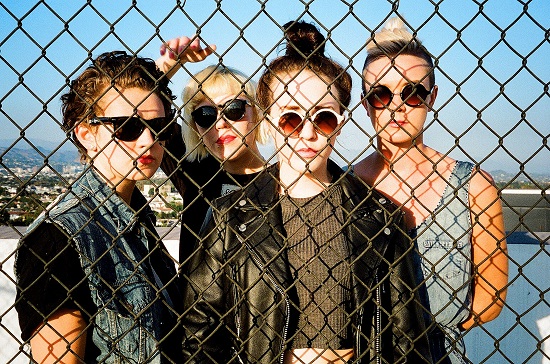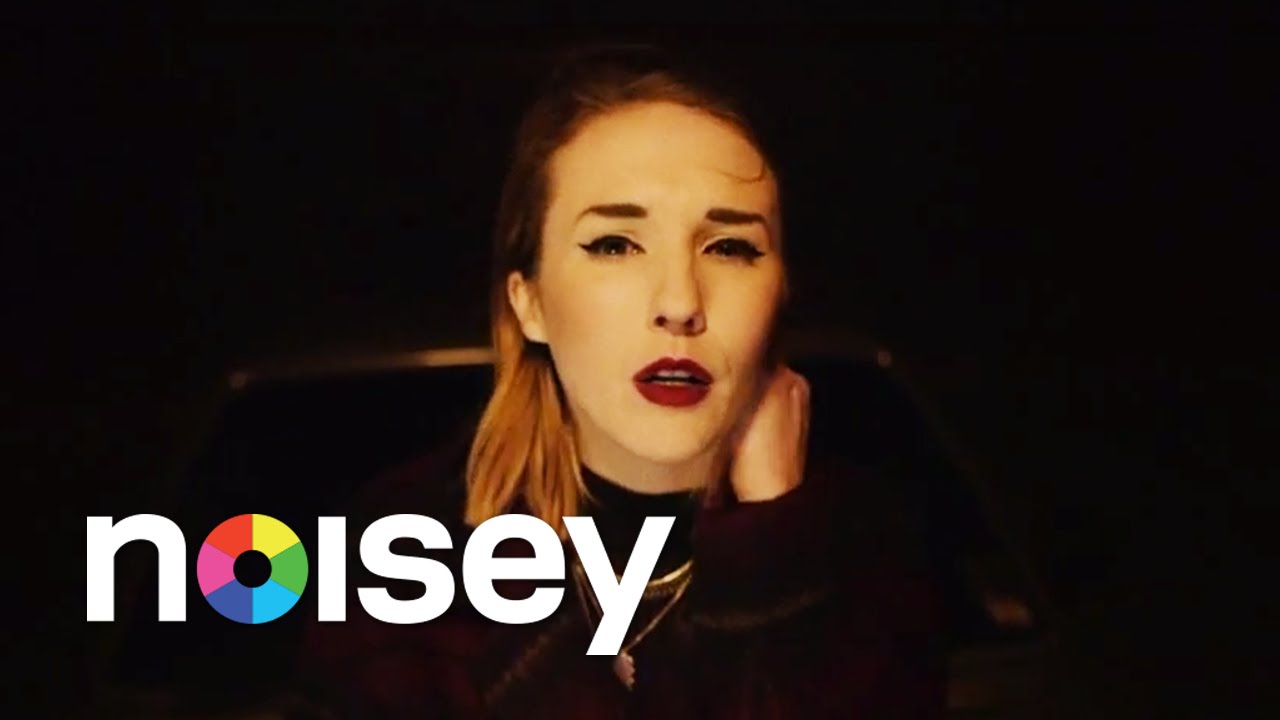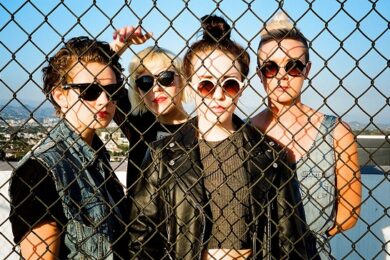Housed in Manchester’s Platt Hall, the Gallery Of Costume is home to thousands of items of clothing and fashion accessories dating back 400 years. On a Monday morning it is pretty deserted, but the elegant rooms contain everything from a 1910 wool dress worn by the city’s suffragettes – replete with the ‘Votes For Women’ sash – to rib-crunching Victorian corsets, perilous Jimmy Choo shoes and never-to-be-in-fashion-again horror frocks from the 1980s.
I’m at the Gallery to meet singer/guitarist Faith Vern and guitarist Lois Macdonald of PINS. They’ve chosen the venue for a chat about their second album, Wild Nights, and for a quick nosey around the museum. Each of PINS is passionate about fashion and when we sit down for a cup of tea (properly brewed and served in bone china) Faith and Lois reflect on the music industry’s wearisome misogynistic reaction to the notion of style and image.
I have known PINS for a while. Back in 2012, I conducted their first ever interview – the only time a journalist is reasonably permitted to ask a band about the genesis of their name – in an upstairs storeroom in a Manchester pub.
As we talked a fire engine arrived, sirens blazing, and several firefighters piled into the bar downstairs. Faith and bassist Anna Donigan (drummer Sophie Galpin and new member keyboard player Kyoko Swan complete the line-up) were wholly unfazed by the potential crisis unfolding below and kept talking about their brand of sparkling garage rock, which, at the time, had made them Manchester’s most talked about band. Back then, I realised PINS were nails.
A few months later, I saw them hold their own supporting Savages in a wooden cage in Salford’s Führer Bunker amid a cloak of dry ice and a wallop of raw potential.
In the intervening years, PINS have worked like hell. After self-releasing their early singles, the band signed to Bella Union and put out a debut album, Girls Like Us, in 2013. Then they upped their workload via a seemingly continual touring cycle – this year alone has seen a mix of headline shows and support slots for Sleater-Kinney, Babes In Toyland and Wire – while launching their Haus Of PINS imprint.
The hard work seems to be paying off – Wild Nights is a corker of an album and the confident sound of a band exploring and developing. Recorded in the infamous Rancho De La Luna studios in California’s Joshua Tree, the post-punk energy remains, but the songs are sharper and more melody-focussed. That raw potential has morphed into style and substance.
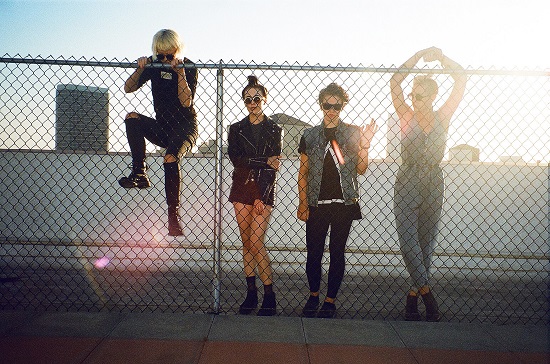
I was chatting to another band recently. They are an all-female group and they told me that they love your music and also love your image. They liked the idea that someone could go to one of your gigs and the next day go out and buy clothes to look like PINS – which was something they felt their band could never achieve. How important is having an image for PINS?
Faith Vernon: An entire image is connected and it becomes an extra extension of yourself. You have the music, and then you have your clothes, the artwork, the projections we have behind us onstage, and even the instruments we choose. I was only saying yesterday that I couldn’t get a red guitar, as it would ruin the image. Obviously, it wouldn’t and I was joking, but our image is something we think about. The visual representation of a band is important to us – but it is not the most important thing. It is very secondary to the music.
Has the visual representation of PINS always been important?
FV: No. We weren’t thinking about our clothes when we were initially cooped up in our practice room in 2012 when no one knew who we were. We didn’t care about our image at that point. We were just making music and that was the thing that held everything together. We built the rest around the few songs that we had. But, even then, everyone said we were “style over substance”.
Lois Macdonald: That was in an early review – “style over substance”.
FV: Now we get “style and substance” – we’ve managed to change the ‘over’ to an ‘and’!
Why do you think you received comments like that?
FV: I think people just enjoy being judgemental and enjoy having an opinion. We were a topic of conversation for a while. No one knew who we were and then we popped up in Manchester and everyone had something to say.
LM: Unfortunately, some of those people did say things like “girls in a band means it is probably going to be rubbish” or “that was pretty good for a bunch of chicks” – which is something someone definitely said after one of our shows.
That’s utterly depressing. I cannot imagine an all-male band having to put up with such nonsense.
LM: In all honesty, probably not. For some people, seeing four women on a stage, going for it, would be a bit intimidating. I think maybe that’s where some of the comments came from. They thought we were just trying to look good and we only messing around with our instruments. How many all-male bands would have similar comments thrown at them? It’s just whether they are good or not. It sometimes happens – when The Horrors first came about they got a lot of criticism for style over substance but then they were trying to project quite a distinct image.
FV: And they looked great – and they were putting effort into how they presented themselves. Bands like The Beatles were uniformed in their choice of clothes. Same with the Sex Pistols – you would think they would have been the antithesis of style but they had a very strong way of visually presenting themselves.
How do you deal with this grinding and relentless misogynism?
FV: We can turn it into something positive and it does come back to that image thing, in a way. Before we go onstage we will get dressed, do our hair, and cover our faces in glitter and then we are ready to go onstage and it doesn’t really matter if anyone has anything bad to say. There are five of us and we are in it together.
LM: Sometimes you have to stick up for yourself, but once you do that it gets easier. We have people ask if we are the band, as if they are surprised we could be the band. For every person who is like that, there is another who is completely normal. We definitely have the attitude that people can just piss off if they don’t like it. At the end of the day, we are just having the best time. We are playing music that we enjoy and that we wrote.
The concept of you having the ‘best time’ is one that is interwoven throughout Wild Nights. Is that how the title came about?
FV: Actually, it was from a poem by Emily Dickinson that I read ages ago and made a little note about. I liked the way it sounded. A few months later, I wrote the lyrics and I had forgotten about making note of the poem. I liked the title at first – the words ‘wild nights’ grabbed me. To me, when I read it – and I know the poem doesn’t actually means this – it spoke to reminiscing about wild nights you have with friends or when you are in a band. That the nights can last forever and you don’t care about tomorrow as you are living in the moment. I think it is actually a love poem about a man, but to me, my interpretation really captured the spirit of this band. Unless stuff is going wrong, playing onstage is a stream of consciousness where you are in that moment. When life is like that you feel really good – yesterday and tomorrow don’t matter – it’s all about what is happening right then. It’s the perfect state to be.
LM: It captures how it feels to be in PINS at the moment. It’s about not knowing when it is going to end and enjoying every single moment of it, because while it can be very challenging, it is very exciting. That is what holds us together. It becomes this joint experience that we are having and something that no one else can ever experience in quite the same way.
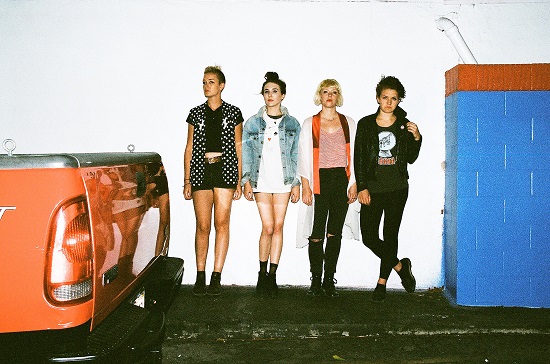
Is there a sense of you having to create an ‘us-against-the-world’ mentality in order to combat some of the misogynistic nonsense you experience?
LM: To a certain degree, yes. I remember being really shocked recently when we were in a rock café in New York airport and they were displaying music icons on the walls. There was one woman – Madonna – and all the rest were men. I was reading an article by Jessica Hopper recently and I felt she made the critical point – it is about having those people to look up to when you are a kid. The only female musicians I really remember as a kid were Courtney Love and Brody Dalle. There were others, but the majority of what I listened to was male punk bands. Jessica Hopper writes about how there are certain genres – emo may be one even though I’m not into that type of music – where it is harder to engage as a woman because we are not represented in any way. We meet so many women who tell us that they want to start a band, but if the role models aren’t there it can be harder to aspire to do it. I hope that is changing – and that all these girls do form their bands.
FV: I think it has changed a little. With people like Courtney Barnett and Deap Vally, it seems that it’s more the norm for female artists to be accepted. It seems that now there is more of a collective attitude and people are more supportive.
On that positive thought, let’s change the subject. I want to ask about Wild Nights. When did you start thinking about a second album?
LM: We started writing the second album pretty much straight away, because we were quite aware that some bands seem to forget to start writing their second album and it seems to take them forever. So, we just kept writing after we’d done the first record and that process took almost a year-and-a-half until we recorded it. That means you can hear many styles on the new album.
The album sounds more diverse, musically, than your debut. Was it a conscious decision to expand your ‘sonic palette’?
FV: People tended to say that our last album was either garage or post-punk. They were the two descriptions that kept coming up, so we really tried to keep out of those boxes. The challenge was more about listening to different kinds of music and pulling them into our style. We spent time looking more into how songs are pieced together as opposed to just getting a load of music and playing it fast and loud. We were more confident to offer ideas and even if we didn’t end up using them, we would try things and add extra instruments.
The album was recorded in Rancho De La Luna studios in Joshua Tree, California. It’s a stupid question, but why did you want to record the album there?
FV: We wanted to have a very different physical space so that we could have a different mental space – so, why not go to a desert.
LM: That is part of the image – a dream of being able to go and submerge yourself in music was amazing. We had a week there and then did a week of mixing, so we only had a week in the actual desert.
How was the experience? Was it as rock & roll as it sounds?
LM: It was brilliant. We left Manchester and travelled for what seemed like a day-and-a-half. I woke up exhausted, looking at the desert through a mesh door. It was amazing – I instantly forgot my tiredness. All you could see was about 90 per cent blue sky and ten per cent yellow sand. We had a routine. In the mornings, we would go and have a look at different things – thrift shopping one day, or a trip to a theme trailer park called Hicksville. We’d go into the studio at about midday and record all through to the evening and then sit around with wine and stare at the stars.
FV: That was one place that, for sure, we’d forgotten about style. We were wearing baggy t-shirts and our hair tied up and no make-up for the whole week. Our image wasn’t considered in the slightest during the recording of the album.
The album Wild Nights is out now via Bella Union. PINS are on tour in September

